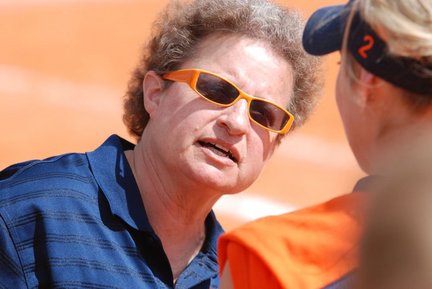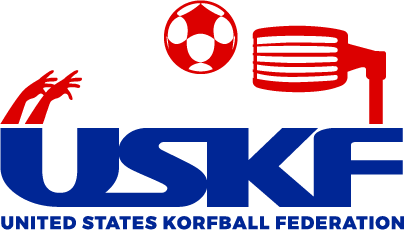
Here I am, on January 17th, standing at the beach of Lake Michigan-one of North America’s Great Lakes. It feels like an inland sea, as the Great Lakes were often called in earlier days. If you travel diagonally across the lake from Chicago, where I am now, in a northeasterly direction, you will arrive in the state of Michigan, specifically in the town of Holland.
Many Dutch migrants settled in this region, as it bears a strong resemblance to the Netherlands along the North Sea. Around Holland, you’ll find places such as Borculo, Overisel, Zeeland, and Noordeloos, all named after Dutch villages. Even today, many surnames in the area reflect Dutch heritage.
It was in Holland, Michigan, where Karla Wolters-a professor of kinesiology and a multi-sport coach-took the initiative about 20 years ago to introduce the Dutch sport of korfball into the curriculum for PE teachers. Korfball is a dynamic, controlled-contact, mixed-gender team sport that originated in the Netherlands and is now played in over 50 countries. It blends aspects of netball, handball, and basketball into a unique and inclusive game where men and women play together in equal roles. This equality in play was what attracted Karla, a dedicated advocate for women in sports.
Her decision to introduce korfball had a lasting impact. In 2005, a European group of korfball players from the International Korfball Federation visited the U.S. on a promotional trip. They played a match against local PE students in front of a fully packed sports hall. The following year, this initiative continued with a return visit to the Netherlands, which ultimately led to Team USA’s participation in the 2007 World Cup in Brno, Czech Republic. Karla served as the assistant coach and team manager. At the time, Team USA was ranked low in the world rankings, making qualification for the World Cup a significant achievement. The team improved throughout the tournament and won its last two matches, securing a 13th-place finish.
Karla retired from Hope College in 2010 and, sadly, passed away much too soon on November 28, 2016. In the wake of her passing, Hope College News published a tribute highlighting her profound impact:
“Karla was a talented classroom professor and softball coach who showed us how to be strong and true through a personal faith in Jesus Christ, as well as through a commitment and dedication to the students of Hope College. Karla’s presence around campus will certainly be missed, but her legacy will be long lasting and one that we will lean into for years to come. The memory of Coach Wolters’ desire to engage Hope College students in the classroom while also challenging them on the field of competition provides us a tangible template for how to provide experiences of academic transformation and competitive excellence.”
Karla brought unprecedented success to Hope College’s softball program, leading the Flying Dutch to five NCAA Division III tournament appearances. She was named Regional Softball Coach of the Year in 1991, 1992, and 1995, and in 2006, the Hope coaching staff was honored by the MIAA. By the time she retired, she was the fifth-winningest NCAA Division III softball coach of all time.
Beyond softball, Karla also coached volleyball, field hockey, and women’s tennis during her tenure at Hope. She had previously coached at Calvin College, where she was named National Division III Coach of the Year in volleyball. Her success in the Michigan Intercollegiate Athletic Association was remarkable, earning 20 conference championships across softball, volleyball, and women’s basketball.
Karla also played a crucial role in introducing korfball to Hope College and western Michigan. In 2005, she hosted a korfball team from Europe, and the following summer, a team of Hope students and recent alumni traveled to Europe for a series of games. She later served on the governing board of USA Korfball and was an assistant coach for Team USA at the 2007 World Championships in the Czech Republic.
Sharon DeKleine, a well-known coach from Grand Rapids, Michigan, and a close friend of Karla, shared these heartfelt words:
“Karla was my softball coach for four years, my mentor, my reffing partner; I assisted her for one season coaching softball, and she was a caring friend who died way too soon. She loved collecting antique sports memorabilia-she had quite the collection. She promoted women in sports across multiple disciplines.
I refereed volleyball with her for many years and assisted her in coaching softball. I also spent time with her at her camp in Maine. Her number one priority was that we knew the Lord. She shared devotionals and guided us as we played for her. She loved teaching the fundamentals and had a gift for putting people in the right positions on our teams. She truly helped us become a team. She was an intense competitor.
Karla introduced me to korfball, explaining the essentials of the game and sharing stories of her travels and successes with the Hope College team. She even connected me to a manufacturer so I could purchase my own korfball set for teaching. Thanks to Karla, I still teach the basics of korfball to my elementary school students, using the very same equipment she helped me acquire-including a real korfball.”
Standing here on this beach, I can’t help but think of Karla-a remarkable woman, athlete, and coach-who championed equality in sports. I believe she would have loved knowing that this weekend, just across Lake Michigan, about 100 miles away, Team USA Korfball is holding a training weekend in Chicago as a step toward a stronger future.
This team brings together athletes from California, Minnesota, Alabama, Ohio, and Wisconsin, all working toward a long-term vision: building a healthy and sustainable korfball community in the United States. Karla’s legacy continues to inspire us, reminding us that true progress is made by those who dare to pioneer, to advocate, and to believe in something greater than themselves.
Best, as always,
Coach Dankmar

